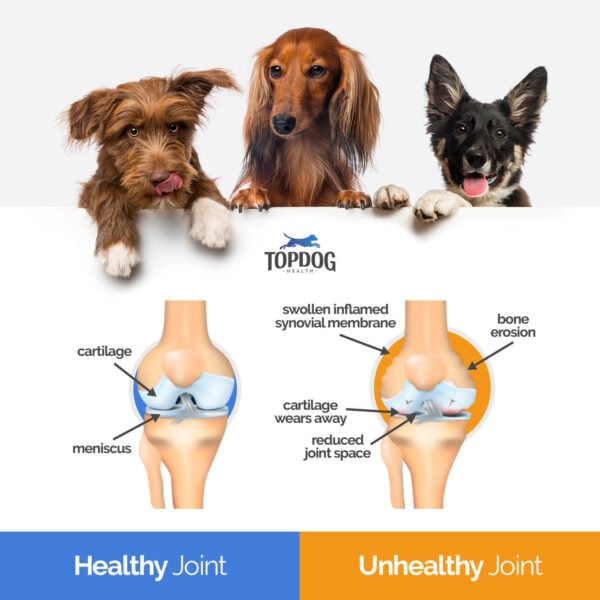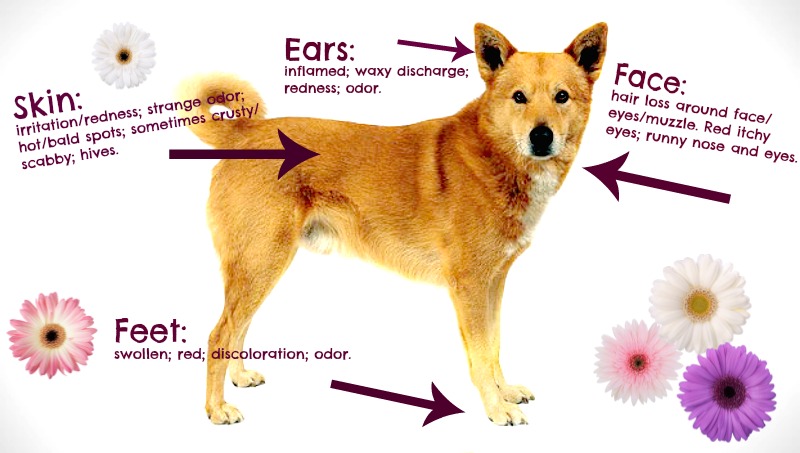Best Tips To Selecting Natural Dog Probiotics
Best Tips To Selecting Natural Dog Probiotics
Blog Article
Omega-3 Fatty Acids Can Help Pets And Felines With Their Joint Health.
Omega-3 fatty acids and in particular EPA (eicosapentaenoic acid) and DHA (docosahexaenoic acid), play a significant part in sustaining and improving joint health in both cats and dogs. Here's what they do:
Anti-inflammatory Properties
Reduce Inflammation
Function Omega-3 fat acids possess powerful anti-inflammatory properties. They can reduce inflammation by blocking the production of pro-inflammatory Cytokines (and eicosanoids) and eicosanoids, which are a class of molecules.
Benefits In reducing inflammation within the joints, Omega-3s can reduce swelling and pain caused by arthritis. This can improve their quality of living by enhancing the level of comfort for pets.
Joint Lubrication and Health
Improved Joint Lubrication
Function Essential: Omega-3 acids are necessary for maintaining the health of synovial fluid, which is what lubricates joints.
Benefits: A higher level of lubrication can result in more fluid movement of joints, and less friction. It will also decrease wear and tear on the cartilage. This is especially beneficial to pets with joint issues or who are at risk of developing them.
Cartilage Protection and Repair
Cartilage Protection:
Function: Omega-3s aid in the health of cartilage through inhibiting the enzymes that degrade cartilage.
Benefits: Preventing cartilage degradation helps maintain joint integrity and reduce the risk of joint disorders like osteoarthritis.
Immune System Support
Immune System Regulation:
Function The function of these fatty acids is recognized for their ability to regulate and balance the immune system.
Benefits: An immune system that is well-regulated can help to better manage joint issues. This helps to prevent joint inflammation and damage.
Comfortable Mobility and Increased Comfort
Improved Mobility:
Omega-3s serve a range of purposes. They can reduce inflammation and they preserve the joint structure. This allows pets to move more easily.
Benefits: Pets, particularly older pets or those suffering from arthritis, typically show greater mobility as well as less pain leading to a more active and relaxed life.
Additional Health Benefits
Overall Health
Function The Omega-3 fatty acids aid in skin, cardiovascular and coat health, which could contribute to the overall health of pet.
Benefits : A pet that is healthier will likely be more active and have healthier joints over time.
Use and considerations
Dosage administration, dosage and dosing: The dosage of Omega-3s that's appropriate for your pet depends on its size, weight and any specific health conditions. The recommendation of the veterinarian or label directions are crucial.
Omega-3s can be obtained from fish oil supplements. These are a great source of EPA and DHA. It is crucial to select supplements specifically designed for pets to ensure safety and efficacy.
Omega-3 supplements can trigger side effects. Some pets have fishy breath or gastrointestinal problems. If you start with a small dosage and gradually increasing it and gradually, you can reduce any adverse negative effects.
The article's conclusion is:
Omega-3 fat acids are beneficial to the joint health of both cats and dogs. Their anti-inflammatory properties, capacity to increase joint fluidity, safeguard cartilage and support the immunity system contributes to better joint functions and reduced pain. Regular supplementation can lead to greater mobility and a healthier, more active lifestyle for pets. Have a look at the recommended yeast infections in dogs examples for website recommendations including pet ear supplements, pet joint support, cushings disease natural treatment, pet hops supplements, pet collagen supplements, pet ginger supplements, pet supplements for pets with worms, pet arthritis supplements and more.
How Can Omega-3 Fatty Acids Help With Kidney Failure In Dogs And Cats?
Omega-3 fatty acids, like EPA (eicosapentaenoic acids) and DHA - docosahexaenoic acids - can help support kidney health in dogs and cats. They may aid in reducing kidney disease.
Anti-inflammatory Properties
Reduction of Inflammation
The function: Omega-3 fats provide powerful anti-inflammatory properties and reduce the production of proinflammatory cytokines.
Benefits: Because omega-3s reduce inflammation, they are able to slow down the progression of kidney disease as well as improve kidney functions.
Blood Pressure Regulation
Low Blood Pressure:
Function Omega-3 fatty acids control blood pressure by improving the function of arteries and decreasing systemic inflammation.
Benefits: Lowering the blood pressure can help protect kidney function and slow down the progression of kidney disease.
Proteinuria Reduction
Reducing Proteinuria:
Function: Omega-3s are believed to reduce the amount of protein that is released into urine. This is known as proteinuria, and is a frequent problem in kidney diseases.
A decrease in proteinuria can reduce kidney damage and also aids in maintaining kidney function.
Glomerular Filtration (GFR) A measure of the speed that a glomerular filterate is produced, can be preserved.
Supporting Kidney filteration:
Function Omega-3 fatty acid is used to keep the integrity of the glomerular filtering process, through which kidneys filter blood.
Benefits: A steady GFR helps to preserve kidney function and slow the progress of chronic renal disease.
Appetizer Stimulation and Nutritional Support
Increased appetite:
Omega-3s have the ability to increase appetite in animals with kidney disease, which often suffer from a decrease in appetite.
Benefits : A diet that is healthier can improve general health. It also aids in maintaining the weight and muscle mass of animals suffering from kidney disease.
Cardiovascular Health
Aiding Heart Health:
Function: Omega-3 fatty acids help improve cardiovascular health by reducing blood pressure and inflammation and improving lipid profile.
Benefits: A healthier cardiovascular system can reduce the risk for complications such as kidney disease or heart disease. Additionally, it enhances overall health.
Antioxidant Effects
Reducing Oxidative Stress:
Function They are antioxidants which reduce kidney damage caused by oxidative stress.
Benefits Reduced oxidative stress can help ensure the protection of kidney cells as well as improve kidney function.
Use and Considerations
Dosage & Administration: The amount of omega-3 fatty acid to give depends on the size, weight, and health condition of your pet. It is essential to follow the veterinarian's recommendations or the product label instructions. Omega-3s come from fish oil supplements that are specially designed for pet owners.
Omega-3 supplements can be found in various varieties. They can be found in liquid oils, capsules, and chewables. You should choose the one that is high-quality to ensure its safety and effectiveness.
Omega-3 supplements may cause stomach upsets in certain animals. To avoid any adverse reactions, start by taking a small amount, and then increase it slowly. The monitoring of any adverse effects like diarrhea or vomiting is vital.
Conclusion
Omega-3 fatty acids can be beneficial for treating kidney disease in cats and dogs. Their anti-inflammatory, blood pressure-lowering, proteinuria-reducing, and appetite-stimulating properties help support kidney function and overall health. Regularly taking omega-3 supplements can reduce the risk of progression of kidney disease, improve quality of life, and enhance the well-being of pets suffering from kidney disease. Take a look at the most popular one-time offer about treatment for cushings disease in dogs for blog examples including pet dental supplements, pet supplements for pets with skin ulcers, pet supplements for pets with skin wounds, pet supplements for pets with diabetes, pet slippery elm supplements, urinary infection in dogs, pet joint supplements, urinary infection in cats and more.
Probiotics For Dog And Cat Yeast Issues?
Probiotics can help treat yeast infections in cats, dogs and other animals by ensuring an equilibrium in the gut microbiome, as well as on the skin. Probiotics can help treat yeast infections:
Restorative microbial balance
Balancing Gut Flora:
Function: The probiotics bacteria are beneficial microorganisms that maintain an optimal environment within the digestive system.
Benefits A balanced gut bacteria supports immune function and helps in reducing the development of yeast like Candida which is a cause of infections. This helps in the treatment of yeast infections throughout the body.
Competition with Pathogens
The Competition of Harmful Microorganisms with Harmful Microorganisms
Function: Probiotics are able to battle pathogenic bacteria, like yeast, in the gut or on the skin to compete for the available space and resources.
Benefits: Probiotics decrease the ability of yeasts as well as other pathogens to trigger infections by outnumbering them and competing with their counterparts. They also help maintain the health of microbial communities.
Modulation of Immune response
Enhancing Immune Function
Function: Probiotics support immune system function by influencing the production of immune-regulating substances.
Benefits A stronger immune system helps the body to fight against yeast and lessen the occurrence of.
Antimicrobial Substances Production
Production of Antimicrobial Factors:
Function: Some strains of probiotics make substances, like Bacteriocins, which have antimicrobial properties that fight yeast as well as pathogens.
Benefits : Antimicrobial compounds are able to stop the growth or development of yeast. This assists in treating and control of yeast-related illnesses.
Reduce inflammation
Anti-inflammatory Effects:
Function: The anti-inflammatory properties of probiotics may help to reduce the inflammation that is associated with yeast infection.
Benefits by reducing swelling probiotics could reduce symptoms of yeast infections like itching, redness, and achy.
Support for Skin Health
Maintaining Skin Barrier Function:
Function: Probiotics help maintain the integrity of the skin barrier.
Benefits: Healthy skin barriers are less susceptible than those with a poor health status to fungus-related infections. They block yeasts and other pathogens from getting into the skin and infecting it.
Use and considerations
Select probiotic supplements that contain strains known to enhance skin health and fight yeast infections such as Lactobacillus and Bifidobacterium.
Probiotics can be found in various forms, like chews, capsules, tablets that can be chewed or powdered. Probiotic formulations for topical use can be beneficial in treating localized skin infections.
Probiotics must be used for a long duration to prevent yeast infections and keep the balance of microbes.
Consultation with Veterinarian - Always consult with your vet prior to beginning probiotic supplementation in your pet. They can provide advice about the best strains to use, as well as dosage and duration, based on your pet’s medical needs.
The final sentence of the article is:
Probiotics are a great way to manage yeast infections on dogs and cats. Probiotics help maintain an equilibrium of microbial health and boost immune function. They also help reduce inflammation and improve skin health. They can also help to decrease the frequency and severity of yeast infections. When they are included in a complete therapy program they will significantly enhance the level of comfort and overall health of pets suffering from yeast infection. Follow the recommended on the main page on dog coughing for website examples including pet herbs, pet alfalfa supplements, pet red clover supplements, yeast infection natural treatment, pet supplements for pets with fear of grooming tools, pet probiotics australia, pet supplements for pets with joint stiffness, pet supplements for pets with fear of grooming and more.